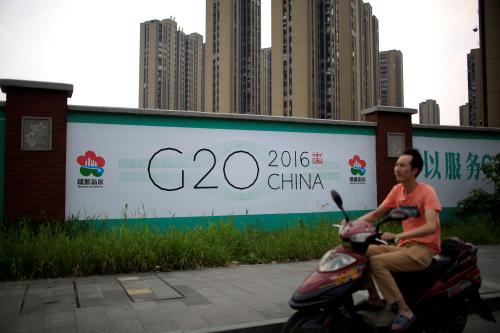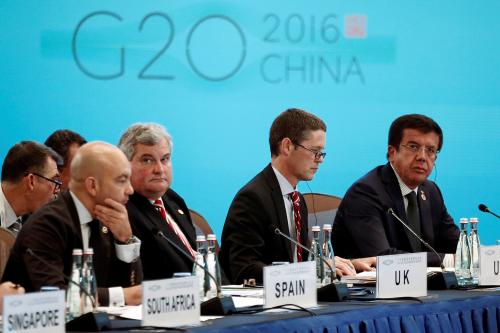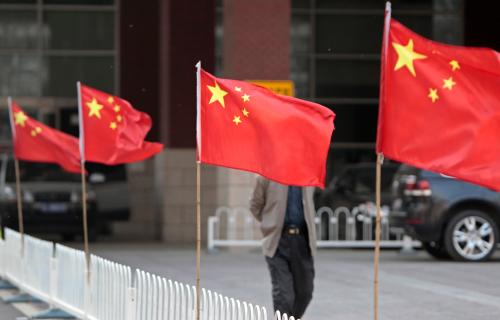

2:30 am CST - 6:30 am CST
Past Event
Content from the Brookings-Tsinghua Public Policy Center is now archived. Since October 1, 2020, Brookings has maintained a limited partnership with Tsinghua University School of Public Policy and Management that is intended to facilitate jointly organized dialogues, meetings, and/or events.
On September 13th, 2016, the Brookings-Tsinghua Center organized the closed-door meeting “After Hangzhou: Next Steps in International Cooperation.” Hosted by the Brookings Institution’s David Dollar and Amar Bhattacharya, this conference debriefed the 2016 Hangzhou G-20 summit and deliberated on the future of Chinese contributions to international governance and development.
Representatives from the embassies of Italy, Germany, South Africa, the United Kingdom, the European Union, New Zealand, and Australia engaged in animated exchanges with university professors, think tank scholars, representatives from multilateral institutions, and PRC Ministry of Finance officials. The event comprised three panels, with opening and closing remarks provided by David Dollar.
The first session, Outcomes of China’s G-20 Presidency and Follow-up Agenda, began by reflecting on the underrated accomplishments of the finance track and discussing whether language of G-20 reflects China’s realities on the ground. Panelists emphasized the challenge of China’s potential trade-off between needed structural reforms and short-term growth, as well as the need to organize clear individual agendas into a cooperative framework. Once opened to the floor, the conversation moved to answering the backlash facing globalization by stressing inclusivity and improving China’s environment for foreign investors.
The second session examined Climate and Sustainable Infrastructure. Opening with remarks on the long road ahead before the world realizes the ambition of the Paris Agreement, the panel’s discussion centered on the inevitable importance of infrastructure in the coming decades. As the rising standards of living in emerging powers will require enormous increases in carbon consumption and urban infrastructure, panelists emphasized the need to ensure that new constructions adhere to green standards and are inclusive in their service. The roundtable conversation covered ways to reform financial systems to meet infrastructure funding when most projects are neither easy to complete nor especially bankable, using green bonds and specialized environmental banking personnel as examples.
The third session discussed the opportunities and challenges presented by China’s Belt and Road Initiative. Panelists stressed that Chinese commitment to the Belt and Road Initiative runs deep, despite the risks presented by the project and by the tension between China’s non-interference principles and its need to protect capital and personnel abroad. Optimists highlighted China’s success with large infrastructure projects due to its experience and talented workforce, while those concerned emphasized the need for security, detailed implementation roadmaps, connectivity optimization, and for countries along the Belt and Road to invest in complementary aspects like trade facilitation, investment regimes, and customs and business regulation reform. The session’s open discussion examined the adherence of Chinese official development assistance (ODA) projects to international standards, Chinese interest in emerging as a global leader to the west with the Belt and Road Initiative and to the east with FTAAP, and ways for China to demonstrate its good intentions to the U.S. and E.U.
 Above: David Dollar moderating Panel 3
Above: David Dollar moderating Panel 3
 Above: Panel 3 group discussion
Above: Panel 3 group discussion
 Above: Gao Haihong speaking on Panel 1
Above: Gao Haihong speaking on Panel 1
 Above: New Zealand Embassy Rebecca Mawson, Australian Embassy Sarah Kirlew
Above: New Zealand Embassy Rebecca Mawson, Australian Embassy Sarah Kirlew
 Above: Full view of roundtable
Above: Full view of roundtable
[All photos by Hou Xiaojun]
Related Content

David Dollar
August 29, 2016

Cheng Li
September 2, 2016

Cheng Li, Zach Balin
August 29, 2016
2016
Reception Hall at Main Building, Tsinghua University
Wednesday, 2:30 am - 5:30 am CST
1:30 pm - 1:35 pm
1:35 pm - 2:15 pm
Moderator
Panelist
2:15 pm - 3:35 am
Moderator
Panelist
3:35 pm - 3:55 pm
3:55 pm - 5:15 pm
Moderator
Panelist
5:15 pm - 5:20 pm
2026
The Brookings Institution
Wednesday, 10:00 am - 12:15 pm EDT

Ahmadou Aly Mbaye, Mbayang Thiam
February 6, 2026

Shahid Yusuf
February 5, 2026